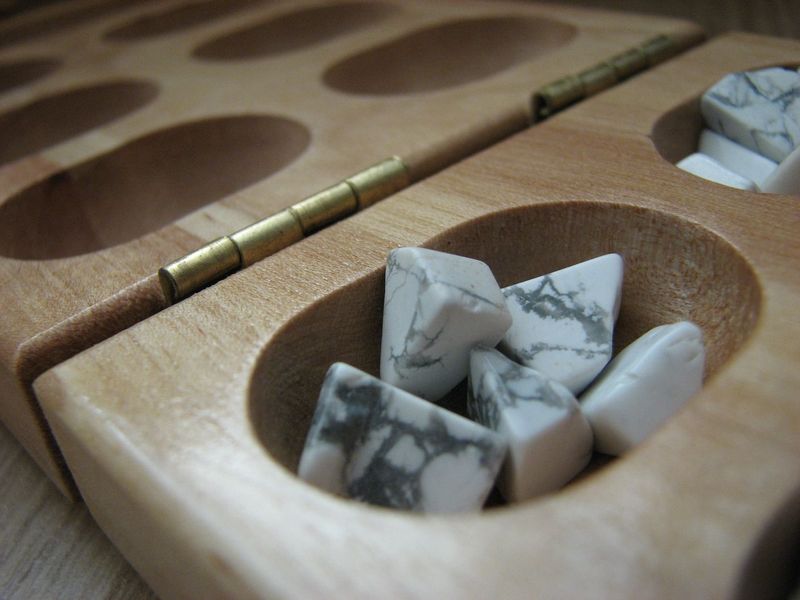Kalah is a traditional African board game that has been played for centuries. It originated in the region of present-day Eritrea and Ethiopia, and has since spread to other parts of Africa and the world. The game is a variant of Mancala, a family of board games played around the world.
Game Components of Kalah
Board: A special board with two rows of 6 small pits (houses) and two big pits (stores or end zones) at each end.Seeds: Typically 4 seeds in each house at the start, although variations can change this number.Optional: Folding wooden board, natural stone pebbles, drawstring bag, and instructions.
How To Setup Kalah
To set up Kalah, place the board between the two players. Each player controls the six houses and the store on their side. Traditionally, four seeds are placed in each of the 12 houses. Ensure the stores at each end of the board are empty at the start.
Gameplay Mechanics and Game Objective
Objective: Accumulate more seeds in your store than your opponent.Turns: Players take turns sowing seeds. A turn involves removing all seeds from one of the houses under the player’s control and dropping them one by one into subsequent houses in a counter-clockwise direction, including the player’s store but not the opponent’s.Capture: If the last seed lands in an empty house and the opposite house has seeds, capture both the last seed and the seeds from the opposite house, placing them in the player’s store.Extra Turn: If the last seed lands in the player’s store, the player gets an additional turn.Game End: The game ends when one player has no seeds in their houses. The other player moves all remaining seeds to their store, and the player with the most seeds in their store wins.
Player Experience
Kalah is a game of strategy and foresight, requiring players to think ahead to maximize their seed collection. The gameplay can be engaging and challenging, especially as the game progresses and the number of seeds dwindles. It’s a great game for kids and adults alike, promoting critical thinking and strategic planning.
Pros
Engaging Strategy: Encourages critical thinking and strategic planning.Simple to Learn: Easy to understand the basic rules, making it accessible to a wide range of players.Historical Significance: Part of the ancient Mancala family of games, offering a connection to traditional gameplay.Portable: Often comes with foldable boards and small seeds, making it easy to carry around.
Cons
Solved Game: With perfect play, the starting player always wins in many variations, which can make the game less competitive.Complex Variations: While the basic rules are simple, some variations can introduce complex rules that may confuse new players.Luck Element: While strategy is key, there is a minor element of luck in where the seeds land.
Personal Thoughts on Kalah
Kalah is an excellent game for anyone interested in strategy and history. It’s a great introduction to the Mancala family of games and is suitable for families, casual gamers, and those looking for a game that challenges their strategic thinking. However, competitive players might find the game less engaging due to its solved nature with perfect play. Nonetheless, it remains a fun and engaging game that can be enjoyed by people of all ages.
We are supported by our audience. When you purchase through links on our site, we may earn an affiliate commission, at no extra cost for you. Learn more.

